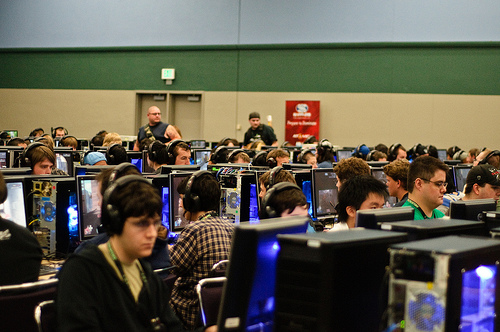I have never been one of those people who have really gotten into computer games. Partly it is because I think my hand finger co-ordination is probably not that good, and I never had them as a kid so I never developed the habit.
However there was a point in life as an adult I did get a Playstation (PS1). I got it with a couple of games – and for brief moment in time I experienced what it is like to be hooked. Struggling to get the next level I promised myself that I would go to bed after one more attempt – this promise occurred repeatedly until 4am on a couple of occasions.
Recently concerns over the level of involvement some teenagers have with gaming has made the news with reports an 11 year old boy was been treated at a psychiatric facility, due in part to his unhealthy obsession with computer games.
Last year (2009) in the US a retreat for internet addiction was opened in Washington with one of its patients been a teenager who had become ‘addicted’ to World of Warcraft. Similar clinics have been in Europe since 2006. Australian mental health experts report seeing an increase in similar episodes occurring, one expert mentioned meeting with a teenager who had played a game for 37 hours straight stopping only for toilet breaks.
The NPD groups survey of gamers in the US found that 4% of the gaming population could be classified as extreme gamers average over 48 hours a week playing games. The average gamer, across all ages, was found to average 13.5 hours of game playing a week.
Computer or gaming addiction is still a contested issue amongst academics and mental health professionals. There is still no official clinical disorder that can be formally diagnosed, despite many studies showing correlation between acknowledged addictive disorders and obsessive computer usage. Australian academic Diane James found in her research that teenage rates and signs of addiction to mobile phones is comparable to smoking.
Numerous services have started treating internet and computer based obsessions along the same lines as other addiction treatments. Dr. Kimberly Young is one such professional who has established a service to people struggling with technology related addictive behaviours at netaddiction.com.
She suggest the following checklist as a means of assessing a person’s level of reliance on gaming or other computer related behaviour:
1. Do you feel preoccupied with computer games or the Internet ?
2. Do you feel the need to use the Internet with increasing amounts of time in order to achieve satisfaction?
3. Have you repeatedly made unsuccessful efforts to control, cut back, or stop gaming or Internet use?
4. Do you feel restless, moody, depressed, or irritable when attempting to cut down or stop gaming or Internet use?
5. Do you stay online or play games longer than originally intended?
6. Have you jeopardized or risked the loss of significant relationship, job, educational or career opportunity because of the Internet?
7. Have you lied to family members, therapist, or others to conceal the extent of involvement with gaming or the Internet?
8. Do you use the Internet or games as a way of escaping from problems or of relieving feelings of helplessness, guilt, anxiety, depression?
Image by Slightlynorth





